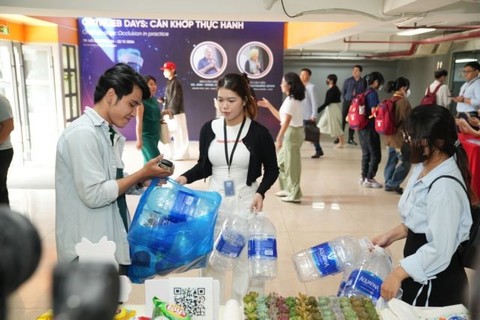
Students of Văn Lang University in HCM City join in the launching ceremony of the “Green University” project. HCM City’s stakeholders are making all efforts to implement waste sorting activities and eliminate plastic waste. – Photo Courtesy of Văn Lang University
HCM City is striving to accelerate its waste sorting programme and eliminate plastic waste from daily life with the collaboration of many stakeholders.
The 2022 Vietnam Law on Environmental Protection stipulates that individuals and households failing to separate waste at the source will face fines of VNĐ1 million (US$39).
The Ministry of Natural Resources and Environment has launched awareness campaigns nationwide to encourage the public to sort waste into three categories - recycled waste, organic waste, and other waste - with an official deadline for implementation set no later than December 31, 2024.
In a city where over 9,000 tonnes of waste are generated daily, numerous programmes and campaigns are being conducted to achieve this goal.
From now until December 31, 2025, HCM City will pilot waste classification at the source into three categories at various locations. Specifically, waste generators producing a significant amount of food waste such as wholesale markets, restaurants, hotels, and shopping centres with dining services will sort waste at the source into three categories, while other groups will continue segregating waste into two categories as done previously.
During the pilot phase, the Department of Natural Resources and Environment will lead and coordinate with local authorities to review and evaluate the effectiveness of the waste segregation pilot programme at the source.
Project launched towards green life
Recently, the "Green University" project was officially launched at Văn Lang University. Co-organised by PepsiCo Foods Vietnam, GRAC, a leading Vietnamese startup specialising in digital transformation solutions for waste management and the circular economy, and Văn Lang University, the project aims to raise awareness of the impact of plastic waste and promote practical actions to protect the environment among students.
The project focuses on addressing waste issues through awareness-raising, improving collection infrastructure, and promoting waste sorting at the source using technological platforms and circular economy models.
Prof. Dr. Trần Thị Mỹ Diệu, President of Văn Lang University, stated: "Building a sustainable campus begins with raising awareness among students, faculty, and staff. Văn Lang University has implemented a sustainable development strategy through 2030, aiming to achieve a plastic-free campus, reduce greenhouse gas emissions, and reach net-zero by 2045. As an educational partner in the Green University project, Văn Lang will collaborate with PepsiCo Foods Vietnam and GRAC to carry out awareness-raising and sustainability initiatives, including workshops, competitions, and 'waste-for-gifts' programmes, from now until 2025. We would like to duplicate this good model in the whole Văn Lang system, and serve as a role model for other Universities in HCM City and across Viet Nam."
An important component of the project is the GRAC application – an intelligent waste management platform that digitalises the household waste collection network and integrates online payment. Through this app, users can easily schedule waste collection, connect with junk shops, and gain a better understanding of waste sorting and plastic recycling.
Nguyễn Trọng Minh, Director of GRAC Technology Joint Stock Company, stated: “GRAC is not just a tool; it is a solution that helps the community, especially young people, develop greener habits, take collective action, and actively contribute to building a circular economy.”
The pilot phase of the project also encourages students from two major universities in HCM City, namely Văn Lang University and the HCM City University of Technology, along with the Green Team volunteers from PepsiCo Foods Vietnam, to participate in long-term plastic waste collection via the GRAC app. Through this app, participants can accumulate points from exchanging plastic waste and receive attractive rewards. The project not only raises environmental awareness but also helps young people develop soft skills, such as communication and creative recycling. – VNS